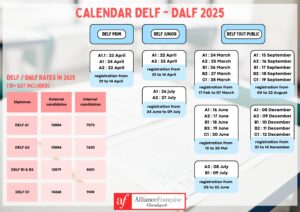DELF : Diplôme d’études en langue française
DALF : Diplôme approfondi de langue française
DELF and DALF are proficiency diplomas in French based on the Common European Framework of Reference for Languages (CEFRL). They are issued by the French Ministry of Education and are internationally recognized, with lifetime validity. At each level, 4 skills are evaluated: listening, speaking, reading and writing.
The Alliance Française de Chandigarh is the official centre for the DELF DALF exams
| DELF / DALF |
| The DELF (A1 to B2) and DALF (C1 & C2) are diplomas awarded by the French Ministry of Education to prove the French-language skills of non-French candidates. There are six independent diplomas, which correspond, respectively, to the six levels of the Council of Europe’ s Common European Framework of Reference for Languages (CEFRL): A1, A2, B1, B2, C1 & C2. |
| The Alliance Française de Chandigarh organizes four sessions exams of DELF & DALF per year. |
| DELF PRIM (for 7 – 11 years of age) |
| The DELF PRIM is an official Diploma of French language Studies issued by the French Ministry of Education and is recognized worldwide. It validates and certifies your proficiency in French. It is destined for children 7 to 11 years of age. DELF PRIM is divided into three levels: A1.1, A1, A2 corresponding to the Common European Framework of Reference for languages (CEFRL). Level A1.1 is the most accessible level and A2 the most advanced. |
| Alliance Française de Chandigarh organizes one exam session of DELF PRIM per year |
| DELF JUNIOR (12 to 18 years of age) |
| DELF JUNIOR is destined for teenagers between 12 to 18 years of age. It has the same basic structure as the standard DELF; only the topics are different. They take into account the interests of the young. The degree of difficulty and the value of the diploma is exactly the same as standard DELF. DELF junior is based on the principles defined by the Common European Framework of Reference for languages (CEFRL). There are four levels: A1,A2, B1, B2. |
| Alliance Française de Chandigarh organizes one exam session of DELF JUNIOR per year. |
LEVELS
| A1 | |
| This level recognizes basic knowledge. It is the most basic level at which a language is used, called the “discovery” stage. At this stage, the learner can interact in a simple way: he/she can speak about him/herself and his/her immediate environment. | |
| A2 | |
| DELF A2 is based on the same principle: it recognises the linguistic competency of a basic user, considered as a social actor. The candidate can communicate in simple and routine tasks requiring the most common polite phrases and exchanges of information. | |
| B1 | |
| At this level, the user becomes independent. He/she can maintain interaction: he/she can understand and maintain a discussion and give his/her opinion. He/she is capable of dealing with situations likely to arise in daily life. | |
| B2 | |
| A B2 user has a degree of independence that allows him/her to construct arguments to defend his/her opinion, explain his/her viewpoint and negotiate. At this level, the candidate has a degree of fluency and spontaneity in regular interactions and is capable of correcting his/her own mistakes. | |
| C1 | |
| Language users at level C1 are independent. They can express themselves fluently and spontaneously. They have a large vocabulary and can choose the appropriate expression to introduce their comments. They can produce clear, well-structured discourse without hesitation and which shows controlled use of structures. | |
The DELF and DALF diplomas are independent, so you can take the examination of your choice. You can also sit the examinations for a number of diplomas during the same examination session.

